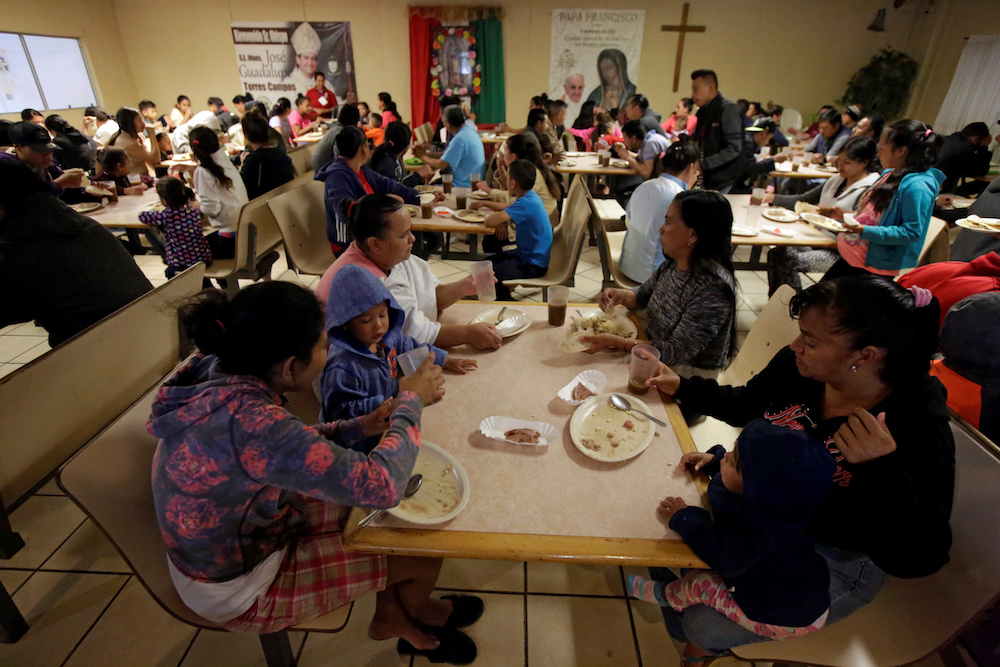Asked about the immigration situation, a national church expert summed it up in two words: "Pretty rough. Catholic charities and diocesan services are overwhelmed."
Then William Canny, executive director of Migration and Refugee Services for the U.S. Conference of Catholic Bishops, tried to add a note of hope: "But there's a tremendous spirit of volunteerism. So, we're strained, but we're doing OK."
That was the best he could say about a year in which the federal government has been accused of mistreating immigrants from Central America seeking asylum in the United States. From separating families to denying people's rights to lack of policy reform, various church leaders have accused the government of violating church teachings on human dignity and the sanctity of the family.
Randolph McGrorty, executive director for the Miami-based Catholic Legal Services, bore down on the theme May 16 at the group's annual New American Awards gala. In his keynote speech, McGrorty reminded everyone of news videos from last year at the U.S. border -- "shocking scenes of children being taken, screaming, from their families. ... Our government sought to make border crossing horrific."
McGrorty said many families were jailed for trying to immigrate, "despite the fact that it's not a crime to come to our border and ask for asylum."
Miami Archbishop Thomas G. Wenski, who has been in the thick of immigration issues for years, added his own concerns. Just before saying grace at the banquet, he said the U.S. government was making the "dream" of opportunity harder to reach "because of our broken immigration system. Unfortunately, too many politicians like it that way."
The archbishop said the system is turning immigrants into a "legally sanctioned underclass" -- similar to what Jim Crow laws did to African Americans in the years after the Civil War. "We'd better not do that again."
He added that "Dreamers," the young people who qualify to remain in the country under the Deferred Action for Childhood Arrivals, or DACA, came to the United States as children and are seeking citizenship "They talk like Americans; they eat like Americans; and they think like Americans," he said. "We must allow them the opportunity to dream like Americans."
The nation's bishops have especially decried the federal "zero tolerance" program of 2018, with parents arrested and children detained separately. The policy ended after several months of public protest and class-action litigation. But the effects have persisted, with some parents deported and their children kept in the U.S. alone. Catholic Legal Services and similar organizations have worked hard to help reunite them.
The Trump administration said the family separation policy had been used by the Bush and Trump administrations, but some dispute that claim.
Theresa Cardinal Brown, director of immigration and cross-border policy at the Bipartisan Policy Center, told USA Today in a recent interview that while the Obama administration "did separate some families," it also tried to detain families together. In 2016, a court ruling limited how long children with their parents could be in family detention centers.
The Trump administration has proposed reforms to immigration policy, calling for a "merit-based" system, but that proposal has been criticized by Cardinal Daniel N. DiNardo of Houston, USCCB president, and Bishop Joe S. Vasquez of Austin, Texas, chairman of the USCCB Committee on Migration.
In a May 17 statement, they said this proposal appears aimed at keeping families from entering the country. They added that the new plan seems to lack a path to citizenship for Dreamers, ignores root causes of migration and doesn't offer "humane and pragmatic solutions," such as alternatives to detention.
Canny repeated the criticism of immigration policy at Catholic Legal Services May 16 gathering. "The family is the core unit of society. We have never seen such a coordinated attack on immigrants. They have no recourse -- they can't go back, and they can't go forward."
He hastened to add that the bishops favor secure national borders, but added that the government must still "treat immigrants fairly." For one thing, he said, applications for asylum should be processed faster. "Right now, it can last more than two years."
Canny also urged Catholics to support organizations such as Catholic Legal Services. "Among asylum seekers who get good legal counsel, a better percentage have good outcomes. So this (CLS) gala is critically important."
Jim Davis is a correspondent for the Florida Catholic, newspaper of the Archdiocese of Miami and the dioceses of Orlando, Palm Beach and Venice.

